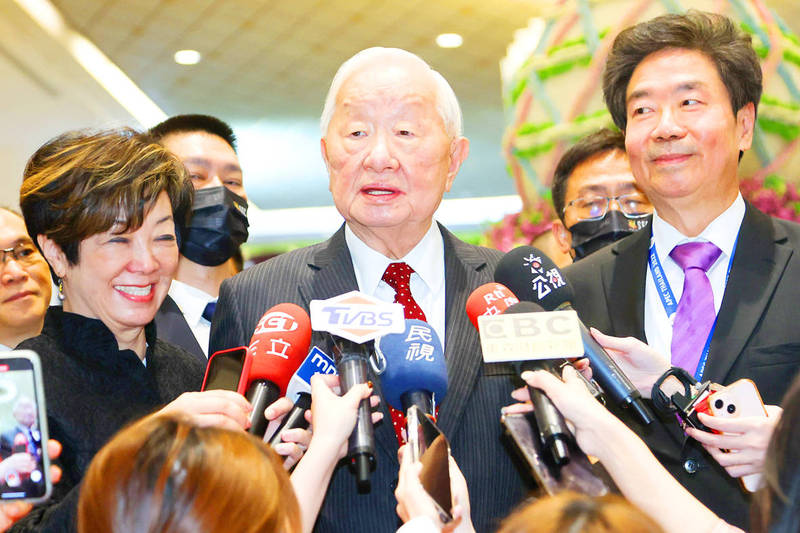《TAIPEI TIMES》 Taiwan’s APEC envoy at the center of chip tension

Taiwan Semiconductor Manufacturing Co founder Morris Chang, center, speaks to reporters after arriving in Bangkok yesterday for the APEC summit. Photo: CNA
By Johnson Lai and Joe McDonald / AP, TAIPEI
Taiwan’s envoy to a gathering of Asia-Pacific leaders is the 91-year-old billionaire founder of a computer chip manufacturing giant that operated behind the scenes for decades before being thrust into the center of US-Chinese tension over technology and security.
Morris Chang’s (張忠謀) hybrid role highlights the clash between Taiwan’s status as one of China’s top tech suppliers and Beijing’s threats to attack the nation of 23 million people, which the Chinese Communist Party (CCP) insists is part of China’s territory.
Taiwan’s decision to send Chang instead of a political leader to the APEC summit in Thailand reflects the nation’s unusual status. The US and other governments have agreed to Chinese demands not to have official relations with Taiwan or have their leaders meet its president.
Chang transformed the semiconductor industry when he founded Taiwan Semiconductor Manufacturing Co (TSMC, 台積電) in 1987 as the first foundry to produce chips only for customers without designing its own. That allowed smaller designers to compete with industry giants without spending billions of US dollars to build a factory.
TSMC has grown into the biggest contract chip producer, supplying Apple Inc, Qualcomm Inc and other customers, and turning Taiwan into a global tech center. TSMC-produced chips are in millions of smartphones, vehicles and high-end computers.
Despite that, TSMC ranks high on any list of the biggest companies that are unknown outside their industries.
Chang, a Texas Instruments Inc veteran who served as TSMC chairman until 2018, represented then-president Chen Shui-bian (陳水扁) at the APEC summit in 2006. He was reappointed to the same job in 2018, 2019 and 2020 by President Tsai Ing-wen (蔡英文).
“Taiwan’s semiconductor industry, especially TSMC, plays a pivotal role in the domestic and even the world economy,” Tsai told reporters on Oct. 20. “At this important moment, Chang is an irreplaceable candidate to serve as the representative of our country’s APEC leaders.”
British Minister of State for Trade Policy Greg Hands said during a visit to Taipei last week that London wants closer cooperation with Taiwan on semiconductors.
Britain is home to Arm Ltd, a leading chip designer.
Taiwan is in a “very challenging environment” and APEC is the “most important international conference venue for Taiwan,” Chang said at the Oct. 20 briefing with Tsai.
“Taiwan needs to build a secure and resilient supply chain with trusted partners, especially in the electronics sector,” he said.
Last year, Chang said that support was eroding for globalization and free markets that helped TSMC prosper.
“Globalization seems to be a bad word and ‘free market economy’ is beginning to carry conditions,” Chang said while accepting an award from the Asia Society.
“Many companies in Asia and America face challenges as to how to operate in the new environment,” Chang said. “Still, I’m confident that solutions will be found.”
Chang spent a quarter-century at Texas Instruments, rising to become a vice president in charge of its semiconductor business, before being invited to Taiwan in the 1980s to lead a technology research institute.
In 1988, TSMC became Taiwan’s first company traded on the New York Stock Exchange. Chang’s stake in the company is worth US$1.6 billion.
TSMC was thrust into geopolitics in 2020 when then-US president Donald Trump blocked the company and other vendors from using US technology to make chips for Chinese tech giant Huawei Technologies Co (華為), which produces smartphones and network gear for phone and Internet carriers.
US officials say Huawei is a security threat and might enable Chinese spying, an accusation the company denies.
Most of the world’s smartphones and other consumer electronics are assembled in Chinese factories. However, they need components and technology from the US, Europe and Asian suppliers — especially Taiwan, the biggest chip exporter.
Huawei, China’s first global tech brand, designs chips, but needs TSMC and other contractors to make them. Their foundries need US manufacturing technology, which gives Washington leverage to disrupt Chinese high-tech industry.
Processor chips are China’s biggest import at US$300 billion a year, ahead of oil. The CCP sees that as a strategic weakness and is spending heavily to create its own chip producers, but they are generations behind TSMC and other global leaders.
US President Joe Biden left Trump’s curbs in place and imposed more restrictions that extend to other Chinese companies.
TSMC, headquartered in Hsinchu, says it made 12,302 different products last year for 535 customers. The company reported a profit of US$18.7 billion and revenue of US$49.8 billion for last year.
新聞來源:TAIPEI TIMES
















